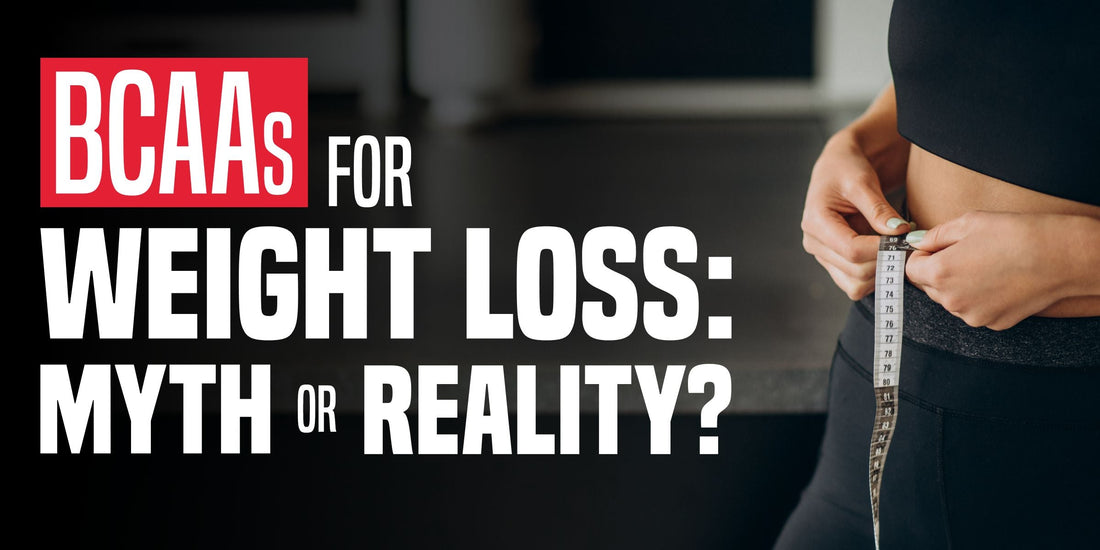
BCAAs for Weight Loss: Myth or Reality?
byBCAAs (branched-chain amino acids) are popular in fitness for weight loss and athletic performance. Leucine, isoleucine, and valine help muscle recovery, reduce soreness, and promote fat loss. However, there are many misconceptions about BCAAs and weight loss.
This blog will provide the facts and debunk myths.
What are BCAAs and their role in weight loss?
BCAAs, or branched-chain amino acids, are a group of essential amino acids that our bodies cannot produce on their own, so they must be obtained through diet or supplementation. These amino acids, leucine, isoleucine, and valine, play a crucial role in muscle protein synthesis and energy production.
When it comes to weight loss, BCAAs have been touted as a valuable tool. It is believed that BCAAs can help preserve muscle mass while promoting fat loss. This is important because during a calorie deficit, our bodies often break down muscle tissue for energy. By supplementing with BCAAs, it is thought that this breakdown of muscle tissue can be minimized, thus preserving lean muscle mass.
However, it is important to note that while BCAAs may have potential benefits for weight loss, they are not a magic solution. They should be used in conjunction with a balanced diet and exercise routine to achieve optimal results.
Myth #1: BCAAs alone can lead to significant weight loss
One of the common misconceptions about BCAAs is that they alone can lead to significant weight loss. While it's true that BCAAs can play a role in supporting weight loss efforts, it's important to understand that they are not a magic solution.
BCAAs can help preserve muscle mass and support fat loss, but they should be used in conjunction with a balanced diet and exercise routine. It's the combination of these factors that ultimately leads to sustainable weight loss.
To put it simply, BCAAs are like a piece of the puzzle in your weight loss journey. They can aid in preserving lean muscle mass, which is crucial for a healthy metabolism and overall body composition. However, without proper nutrition and regular physical activity, relying solely on BCAAs is unlikely to yield the desired results.
Myth #2: BCAAs can replace a healthy diet and exercise
Another myth surrounding BCAAs is that they can replace the need for a healthy diet and exercise. While BCAAs can assist in weight loss, they should not be seen as a substitute for a balanced lifestyle.
A proper diet that includes a variety of nutrients is essential for weight loss and overall health. BCAAs alone cannot provide all the necessary vitamins, minerals, and macronutrients that your body needs. Similarly, exercise is vital for burning calories, building muscle, and improving overall fitness.
Instead of relying solely on BCAAs, it's important to prioritize a well-rounded approach to weight loss. This means consuming a balanced diet that includes plenty of fruits, vegetables, lean proteins, and whole grains, while also maintaining a regular exercise routine.
Myth #3: BCAAs can target specific areas for fat loss
One common misconception about BCAAs is that they have the ability to target specific areas for fat loss. Unfortunately, this is simply not the case. While BCAAs can support weight loss efforts, they cannot selectively burn fat from certain areas of the body.
When it comes to losing weight, it's important to understand that spot reduction is not possible. Fat loss occurs throughout the body as a whole, and where you lose fat first is largely determined by genetics. So, no matter how much BCAAs you consume, they will not specifically target stubborn belly fat or love handles.
To effectively lose fat in any specific area, a combination of a healthy diet, regular exercise, and overall weight loss is necessary. BCAAs can be a helpful supplement in this process, but they should not be relied upon as the sole solution for targeting specific areas of fat loss.
Myth #4: BCAAs can cause muscle loss during weight loss
Another myth surrounding BCAAs and weight loss is the belief that consuming them can lead to muscle loss. This misconception likely stems from a misunderstanding of how BCAAs function in the body.
BCAAs, specifically leucine, isoleucine, and valine, are essential amino acids that play a crucial role in muscle protein synthesis and preservation. When you are in a caloric deficit, such as during weight loss, your body may rely on stored fat for energy. However, without adequate protein intake, it may also break down muscle tissue, leading to muscle loss.
This is where BCAAs can be beneficial. By providing your body with a readily available source of essential amino acids, BCAAs can help preserve muscle mass during weight loss. They can also aid in muscle recovery and repair after intense workouts.
The truth about BCAAs and weight loss
BCAAs can help improve body composition by increasing fat burning and reducing muscle catabolism.
During weight loss, the body tends to break down muscle tissue for energy. However, BCAAs can help prevent this muscle loss by providing the necessary amino acids for protein synthesis. By preserving muscle mass, BCAAs can help maintain metabolic rate and aid in long-term weight management.
Additionally, BCAAs have been found to reduce fatigue and muscle soreness, enabling you to train harder and recover faster. This can be especially beneficial during calorie-restricted periods when you may experience decreased energy levels.
Conclusion
BCAAs are not the enemy when it comes to weight loss. In fact, they can be an effective supplement to support your goals.








